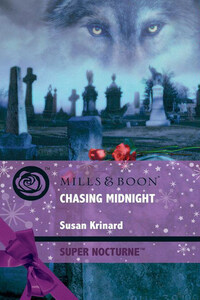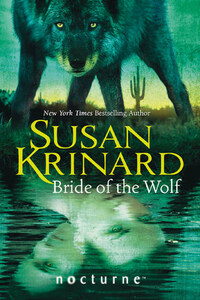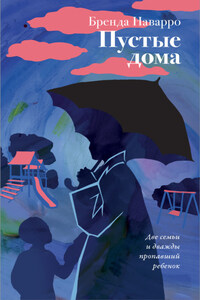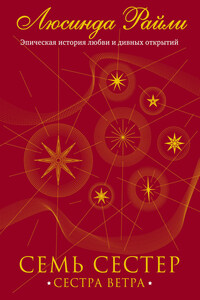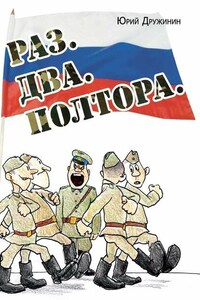âI made no attempt to influence you,â Isis insisted.
âYou are what you are.â
âThat is truly what you think of me?â
âWeâre strangers,â he said. âWhat should I think?â
To Danielâs astonishment, she worked at the fastenings of her robes, and they fell like water to her feet. Beneath them she was naked. And breathtaking. Her body was sweetly curved, full-breasted and full-hipped, her legs shapely and strong, her waist supple.
âYou cannot abide losing control, Daniel,â she said. âNow I give you a choice. You may prove to yourself that I cannot influence youâ¦because I want you, and I will do nothing to make you want me.â
SUSAN KRINARD has been writing paranormal romance for nearly twenty years. With Daysider, she began a series of vampire romances, the Nightsiders series, for Mills & Boon Nocturne. Sue lives in Albuquerque, New Mexico, with her husband, Serge; her dogs, Freya, Nahla and Cagney; and her cats, Agatha and Rocky. She loves her garden, nature, painting and chocolateâ¦not necessarily in that order.
Foreword
For thirty-five years after the end of the war between Opiri1 and humans, the greatest hope for lasting peace lay in the self-contained mixed colonies established along the western seaboard of the former United States of America. These coloniesâunlike the slave-holding Opir Citadels, which kept captive humans as blood donors, and the human Enclaves, which rejected all Opiri as monstersâdemanded full equality between Opiri and human members, and encouraged the willing donation of blood from human colonists.
For many years, such relatively small colonies provided the only working examples of truly peaceful coexistence between humans and Opiri. But rumors of a new kind of mixed colony began to spread: tales of a former Opir Citadel turned free city, populated by hundreds of citizens both human and Opiri.
Never before had the experiment of equality been attempted on such a grand scale. In the original colonies, every member knew every other member; humans were well acquainted with the Opiri who would live on their donated blood. In a city, such personal acquaintance would be far less likely, and the government would have to be correspondingly complex to ensure a steady supply of blood from cooperative humans, to distribute it fairly, to properly apportion work among the citizens, and to prevent less well-adapted Opiri from reverting to the old ways of asserting dominance and obtaining blood by force.
Doubting that such a system could be maintained for any length of time, the Western colonies sent ambassadors to the new city of Tanis. If such a city-state could survive, the hope for a permanent end to war might be realized. If it failed, many on both sides of the divide would regard Tanis as proof that coexistence on anything but the smallest scale might never be achieved.
âFrom The Armistice Years: Conflict and Convergence
1 Colloquially known as âvampiresâ or Nightsiders.
Chapter 1
It was time.
Daniel moved through the woods to the edge of the field, making one last check to be certain that his clothes were appropriately dusty. Cattle grazed in the waning light, and in the distance Daniel could make out the small white forms of sheep. Farther on stood more fields, green with crops, and beyond that...
Tanis. The former Citadel of Tartaros, rising beside the river, its odd but impressive silhouette revealing its nature as a place whereâif the stories were trueâhumans and Nightsiders, or Opiri as they called themselves, lived side by side in peace and equality.
They lived the same way in Avalon, the colony to which Daniel had escaped when heâd fled the Nightsider citadel Erebus, and in Delos, the compound he had governed in the far north of Oregon, where Opiri, humans and half-bloods worked together to fend off common enemies.
Heâd given up his command of Delos and returned to the place where he had first been free. But his reunion with old friends and comrades had been incomplete.
His father had disappeared. Ares, former Bloodmaster of Erebus, had gone east in search of the mysterious half-domed Citadel at the foot of the mountains. Heâd wanted to find out if it was truly possible for an entire city to maintain the equality that only smaller settlements and colonies had managed since the end of the War.
Daniel had serious doubts that such a thing was possible. Nevertheless, since Ares had not returned, he had volunteered to complete his mission. And if Aresâs disappearance had something to do with his going to Tanis, Daniel would find that out, too. No matter what role he had to play.
For now, that role meant blending in among the human field workers as they ended their workday. The path between the fields widened to a dusty dirt road, bounded on both sides by pastures. By the time Daniel reached the crops, the last light of day was reflecting off the several towers of the former Citadel and glinting on the surface of the river behind it. Workersâhumansâgathered along the road to return to the city, while other figures, white-haired Nightsiders, arrived to take their places.

